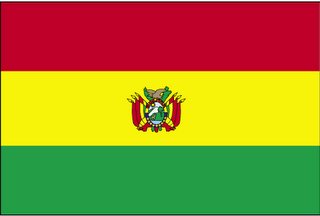Bolivia Leads Civil Society in Climate Change Debate

For the next three days, Tiquipaya - just on the outskirts of the city of Cochabamba -will host social and grassroots organizations as they attempt to influence the ongoing international climate change debate.

On the road leading up to the Universidad Univalle, tents offering local cuisine and culture are pitched among tables manned by representatives from local and international environmental organizations.
While a Bolivian woman mixes ice cream by hand, Energetica - a Bolivian non-profit - demonstrates alternative energy projects that bring power to poor rural communities. Bright green tour buses shuttle participants splashed with stickers that read, "The people are the voice of Mother Earth," and "Save the planet to save the life of humanity".
Although the inauguration of the World People’s Conference will not occur until Tuesday morning, on Monday, working groups commenced debates around 17 specific climate-related issues. Their goal: to create concrete proposals that can be included at the next United Nations Climate Change Conference in Cancun, Mexico this December.
The sounds of fiery debate could be heard in the hallways of the Universidad Univalle where working groups commenced hammering out preliminary face-to-face discussions. Working groups had been collaborating on-line through the WPCC website for several weeks. On Wednesday, the working groups will deliver their conclusions.
The World People's conference is being hailed as the Global South’s answer to the UN’s Climate Summit at Copenhagen in December 2009, where environmental groups and the demands of developing countries were largely excluded.
Bolivia’s President Evo Morales returned from Copenhagen last December disappointed with the lack of commitment from the developed world. The Copenhagen Accord was criticized for failing to legally bind countries to adequate carbon emission reductions.
As a response Morales initiated this alternative summit to include concerns and solutions from civil society. Bolivia rejects the status quo of international climate change policy which favors the demands of developed countries in the Global North – in particular the use of market-based cap and trade. Two initiatives that Morales proposed at Copenhagen include climate change reparations and an international climate court of justice.
President Morales has championed the rights of Mother Earth since he first arrived on the world stage at the United Nations General Assembly in September 2006. There Morales said, "I feel it is important that all the countries, the social forces and the internatinal organizations begin to debate in earnest for the purposes of saving the planet Earth and humanity".
Statements made by Bolivian government officials demonstrate that at the heart of these discussions and debate is a desire to honor life in a way that is harmonious with nature - a way of thinking that can be readily linked to indigenous cosmology.
Of the 17 working groups on climate related issues, one is on the Rights of Mother Earth and another is on Indigenous Peoples. Indigenous representatives from North and South America will likely play a vital role in shaping the language coming out of the conference.
"We're very inspired by the call by President Evo Morales, said Tom Goldtooth, Executive Director of the Indigenous Environmental Network,"when he said we need to recognize the rights of Mother Earth and we need to create a framework for protecting Mother Earth. We're looking for new economic paradigms. We're looking for systemic change and we're here to be a part of this movement of people throughout the world."
The entire World People's Conference on Climate Change and the Rights of Mother Earth will be streamed live over satellite and also webcast.
Photos: Digital Warrior Media
Labels: karah woodward Bolivia Morales World People's Conference climate change Tiquipaya





